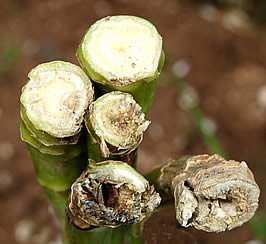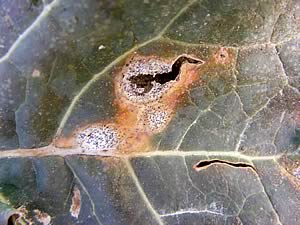| 2010-04-22
For growers in areas of the UK where phoma infection poses a significant threat to rapeseed yields, choosing a variety according to its stem canker disease resistance rating alone is a risky strategy according to Richard Elsdon of United Oilseeds.
“If left unchecked, phoma infection can cause a corky canker to develop in the plant stem leading to premature plant death and a loss of yield.”
 |
Phoma already represents a major risk for growers in France and Australia where stem canker has had a huge impact on yields and productivity. And the disease is steadily becoming more prevalent throughout the UK with reports that phoma leaf spot – the early precursor to stem canker – is spreading northwards.
“Once phoma spores begin to infect a plant, lesions appear on green leaf material during the winter,” Mr Elsdon, technical manager at United Oilseeds explains. “If left unchecked, these lesions will kill out the leaf before moving down the leaf stem into the hypocotyl. As the plant develops during the spring a corky canker develops around the stem of the plant and strangles the flow of nutrients leading to premature plant death and a loss of yield, which in the worst cases, can reach up to 30%.”
On paper, those varieties with the highest phoma resistance rating, such as Excel with a stem canker disease resistance rating of 9, look like the best choice. “But choosing a suitable variety to spread the risk of phoma infection isn’t as simple as that,” Mr Elsdon explains.
Recent research carried out by Rothamsted Research has shown that two types of phoma resistance exist in oilseed rape: Group 1 varieties, such as DK Cabernet and Flash, which possess multiple or quantitative resistance characteristics; and Group 2 varieties, such as Excel and DK Cosmos, which possess a single gene that is resistant to only the most prominent phoma genotype.
“Group 2 varieties may look good on paper, but in the real world, single gene resistance can breakdown leaving crops susceptible to infection by other phoma genotypes. This could leave growers with a phoma infection problem later in the season, by which time it may be too late to apply a fungicide.”
“Phoma leaf spot lesions appear on green leaf material during the winter and can kill out the leaf.”
 |
Mr Elsdon therefore warns growers not to expect Group 2 varieties to remain resistant to phoma infections year after year. “A more sensible approach would be to alternate a Group 1 variety such as DK Cabernet into the rotation in order to vary the resistance mechanism and to prevent the lesser phoma genotypes, which Group 2s are not resistant against, from becoming dominant. This way, growers will be free to use a selection of varieties which not only offer phoma resistance, but which also offer improved harvest yields and higher oil content.”
Growers for whom phoma isn’t necessarily a problem are also advised to consider using a selection of seed varieties with different agronomic characteristics in order to reduce the risks associated with unpredictable weather patterns. “Gone are the days when growing one variety of oilseed rape will satisfy the demand for high crop yields,” Mr Elsdon explains. “The last three seasons have shown that climate change has the ability to throw the growing season into complete disarray. This can result in a late or early harvest with little prior warning.
“Growers can spread their susceptibility to weather related problems by planting more than one variety. For example, Eiffel would compliment a crop of DK Cabernet as it is earlier to mature. Castille has traditionally been the early variety of choice for many farmers, but its yield potential has dropped when compared with newer varieties such as Eiffel. This therefore makes Eiffel a better proposition as it offers similar agronomic characteristics as Castille but with the added advantage of increased yields and improved vigour and reliability.”
 Syngenta S-Pacs a Big Hit with Farmers Syngenta S-Pacs a Big Hit with Farmers
 Versatile Hybrid Brassicas Offer Solution to Forage Shortages Versatile Hybrid Brassicas Offer Solution to Forage Shortages
 United Oilseeds Offers Increased Support for OSR Growers United Oilseeds Offers Increased Support for OSR Growers

|




